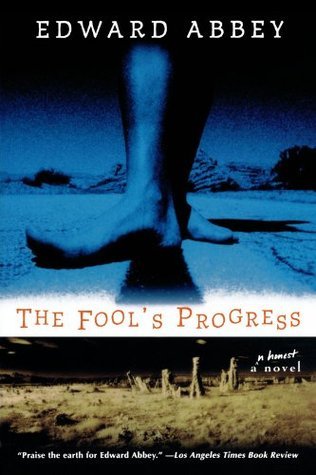
The Fool's Progress
Book Description
A man on the edge of despair takes you on a wild journey through the American Southwest, searching for meaning amid chaos. Henry Lightcap, a disillusioned drifter, grapples with the weight of broken relationships and personal demons. As he travels through rugged landscapes and encounters vibrant characters, the lines between freedom and folly blur. With each decision, the tension escalates—will he find redemption or spiral further into madness? Amidst the striking beauty and haunting isolation, can one man's quest unveil the true essence of life and love, or will it lead to his ultimate undoing? What happens when the fool finally faces the truth?
Quick Book Summary
"The Fool's Progress" by Edward Abbey follows the journey of Henry Lightcap, a cantankerous, self-destructive man fleeing a failed marriage and his own personal failings. Driven by a mixture of despair and defiance, Henry embarks on a cross-country odyssey through the American Southwest, revisiting the landscapes and memories that shaped his life. As he encounters a cast of eccentric characters and wrestles with environmental and existential dilemmas, Henry’s internal struggle unfolds against the wild, unforgiving backdrop of frontier America. Abbey’s narrative explores themes of alienation, the quest for authenticity, and the complex relationship between humans and nature. Ultimately, Henry’s journey is both a search for meaning and an act of defiance against a world he perceives as shallow and corrupt, raising profound questions about redemption, folly, and the human spirit.
Summary of Key Ideas
Table of Contents
The Search for Personal Meaning
Henry Lightcap begins his journey as a disenchanted man, on the brink of collapse following the breakdown of his marriage. Fleeing from the trappings of domestic life, he grabs his father’s old .44 revolver, shoots his refrigerator, and sets out on a wild cross-country trek toward his childhood home in West Virginia. Henry’s journey is part flight, part pilgrimage, exposing his dissatisfaction with modernity, relationships, and the constraints of conventional society. Through witty, acerbic observations, Henry scrutinizes the emptiness he perceives around him, driven by a longing for meaning and escape from his own failings.
The Conflict Between Civilization and Nature
As Henry drives through the vast and untamed terrain of the American Southwest, the stark natural beauty serves as a powerful counterpoint to his internal turmoil. Abbey’s lyrical descriptions make the landscape almost a character in itself, one that mirrors and magnifies Henry’s sense of isolation. The novel is imbued with environmental themes, as Henry rails against rampant development and destruction of wilderness. Nature becomes both refuge and tormentor, offering solace and reflection but also accentuating Henry’s loneliness and existential angst.
Alienation and the Outsider’s Journey
Henry’s interactions with people along his journey are marked by dark humor and complex emotions. He encounters a diverse array of characters—some compassionate, others hostile—each encounter peeling away layers of his cynicism. These meetings force Henry to confront uncomfortable truths about himself: his failures as a husband, friend, and son. Nostalgic recollections interweave with present experiences, illuminating the roots of his bitterness and the substance of his regrets, and casting light on the possibility of reconciliation with his own flawed self.
Redemption Through Self-Discovery
Running beneath Henry’s physical journey is a deeper, spiritual quest: the hope for redemption or clarity. He wrestles with questions of freedom and personal responsibility, debating whether his choices represent true independence or simply stubborn folly. Abbey crafts Henry’s odyssey as both comic and tragic—a middle finger to conformity and materialism, but also a confession of vulnerability and loss. The sharp wit and misadventure mask a profound yearning for connection and a sense of place in a rapidly changing world.
Freedom, Folly, and the American Landscape
By the journey’s end, the line between liberty and despair has blurred for Henry. His return to his boyhood home is both an act of resignation and defiance—a final reckoning with his past and present. Abbey leaves Henry’s fate ambiguous, embodying the paradoxes of the fool’s progress. The novel’s conclusion resonates with both desolation and hard-won insight, inviting readers to ponder whether real freedom lies in escaping society or in confronting the truths that haunt us all.
Download This Summary
Get a free PDF of this summary instantly — no email required.





